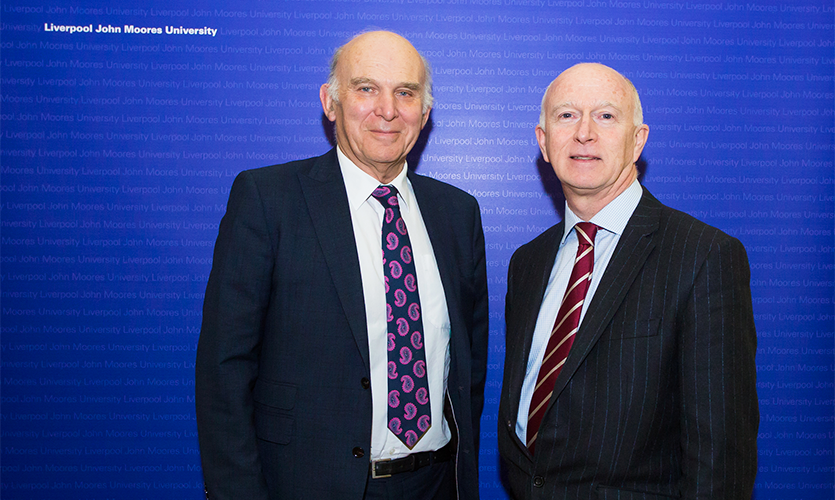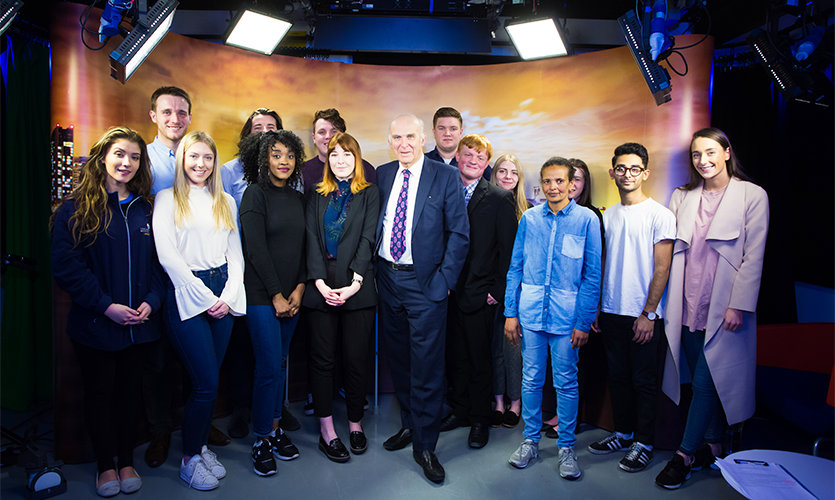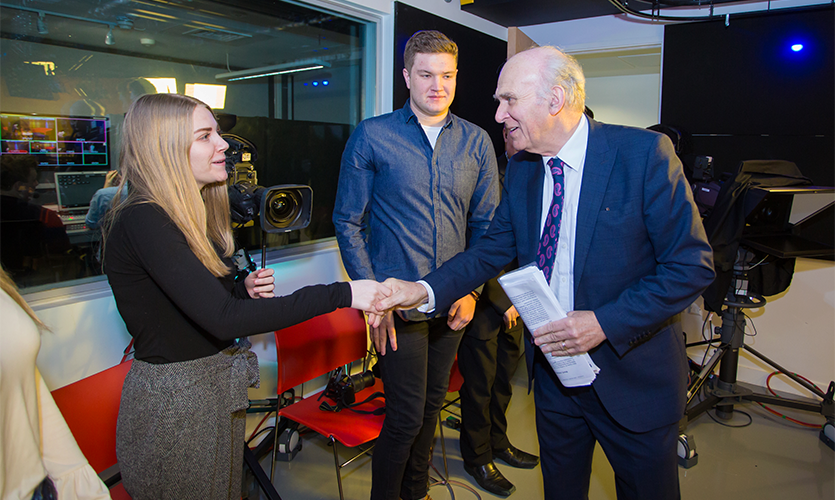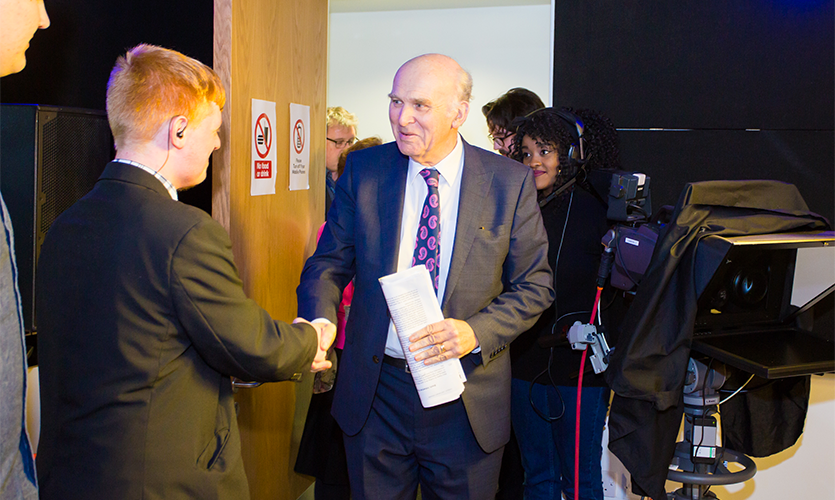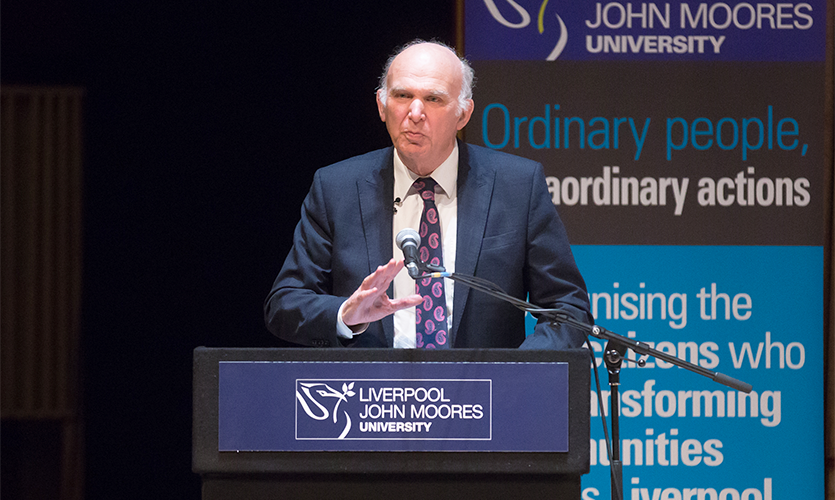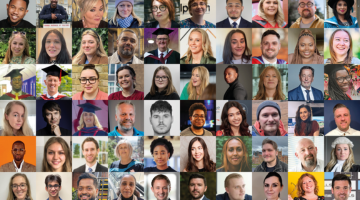Roscoe Lecture Summary: Sir Vince Cable
In the latest Roscoe Lecture from LJMU, Sir Vince Cable, former Secretary of State for Business, Innovation and Skills, warned that “Brexit must not be allowed to become an all-embracing obsession which gets in the way of a proper industrial strategy.”
Delivering the lecture ‘Brexit, Industrial Strategy and the North,’ to an audience of around 1,000 at the Royal Liverpool Philharmonic Hall, Sir Vince called for the public to be open-minded stating that, despite the risks, Brexit could help to rebalance the UK economy and in particular, deal with the imbalance between North and South through an active industrial strategy.
Sir Vince’s lecture covered a wider range of issues on the possible ‘freedoms’ he viewed could be created by Brexit including trade policy, corporate takeovers, the Single Market and state aid rules.
Sir Vince said:
“One of the impediments to an active [UK] industrial strategy has been the severe limits on government intervention imposed by EU state aid rules. These rules exist for good reasons: to create a genuine level playing field for competition; to discourage crony capitalism; and to prevent governments bankrupting themselves by pouring money into ailing industries or engaging in subsidy competition to attract new ones… But it is undoubtedly the case that the European Commission is a far more intrusive and all-embracing source of control over national government intervention.
“I suspect that one reason for the large Brexit vote in South Wales was the belief that Brussels was standing in the way of bailing out the steel industry, and the large Brexit vote on Teesside owed a lot to the inability, as well as unwillingness, of the UK government to save Redcar. For better or worse, the post-Brexit UK – and devolved government - should be able to intervene somewhat more freely in support of industrial strategy.”
Reflecting on his experience of preventing the takeover of Astra Zeneca by Pfizer when Business Secretary, Sir Vince also set out the opportunity Brexit could create to bring about a reform to corporate takeover rules. He commented:
“Our permissive rules on corporate takeovers are underpinned by EU directives designed (at British insistence, like so much else in the Single Market) to create freer EU markets for capital. I took the view that the current rules were too permissive. The market, and management behaviour, are driven by short term gains from share prices not by concerns over long term value which have made it far too easy for British companies, often built up on the expertise of scientists educated at British universities at public expense, to be picked off and acquired cheaply.
“The system needs reform to create a national interest test for blocking takeovers which potentially undermine the science and technology base of the country. I was disappointed to see that Theresa May and Dr Fox were claiming that the acquisition of UK companies by outsiders was a sign of continuing belief by investors in post-Brexit Britain.”
The lecture also explored the implications of Brexit on the North as Sir Vince outlined how the Government’s “declared intention to restrict EU immigration consequent upon Brexit” could bring about wage rises in certain areas of the UK and possibly result in business relocation away from the south, He explained:
“Those regions and sectors of the economy which are growing rapidly will no longer be able to use the escape valve of immigration to meet labour demand. Wages are likely to rise relative to other parts of the UK which will help to make those other parts more competitive in cost terms. Relative wage costs are, of course, only one factor among several influencing regional performance – notably the quality of the labour force, as well as quantity; and the quality of infrastructure – but, to some extent at least, there is an additional incentive to locate offices and factories away from London and the South and East to where labour is more easily available.”
Sir Vince also called for collaboration across the North in scoping and vocalizing what Brexit means for the whole region, adding:
“What is badly missing at present is a regional perspective on Brexit, particularly for the North of England. London has numerous think-tanks grinding out analysis of the impact on the City of London or the capital in general. Scotland is not short of analysis and opinions. Birmingham has just embarked on a serious piece of work with the Local Enterprise Partnership and Birmingham City University. I understand that a Merseyside analysis is being launched too. That is very welcome. Perhaps we also need something wider, a joint exercise - dare I say it – with Manchester and other Northern authorities? If the Northern Powerhouse means something, and is more than just a bit of George Osborne rhetoric, surely this is a key issue on which to collaborate.”
Sir Vince Cable was responsible for Industrial Strategy when he was Secretary of State in the Coalition Government. He outlined some of the concrete achievements from this work on the previous industrial strategy, linking in Liverpool John Moores University through its £2bn Business Launch Centre, as part of the Manufacturing Technology Centre to help the region’s small manufacturing companies. He will mention additional scope for universities to promote innovation locally through incubators or innovation centres for small business on campuses or through spin-offs, with an example in Liverpool being Sensor City, a pioneering £15m partnership between Liverpool John Moores and the University of Liverpool. This will give the region’s high-tech businesses and start-ups access to the know-how and kit to develop sensor technologies to bring new innovations to market and support the rapid evolution of our car and healthtech industries.
A podcast of Sir Vince Cable’s Roscoe Lecture is available here
The next Roscoe lecture will be delivered by John Everard, former British diplomat and former Ambassador to North Korea, who will speak about: North Korea from the Inside
Further information and tickets are available here

